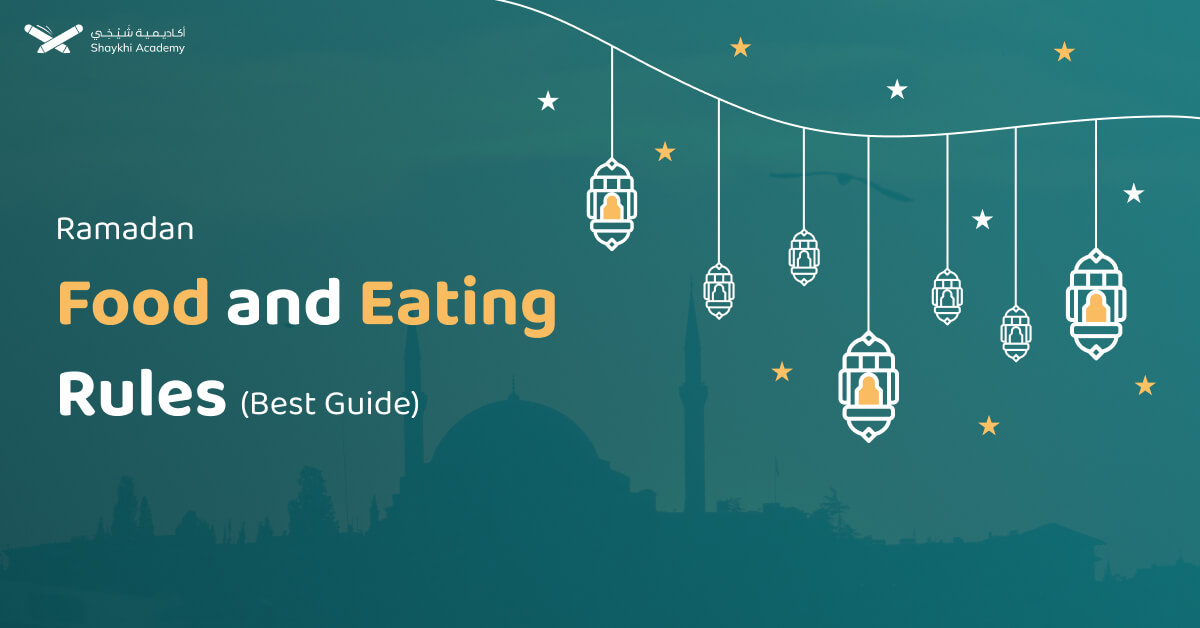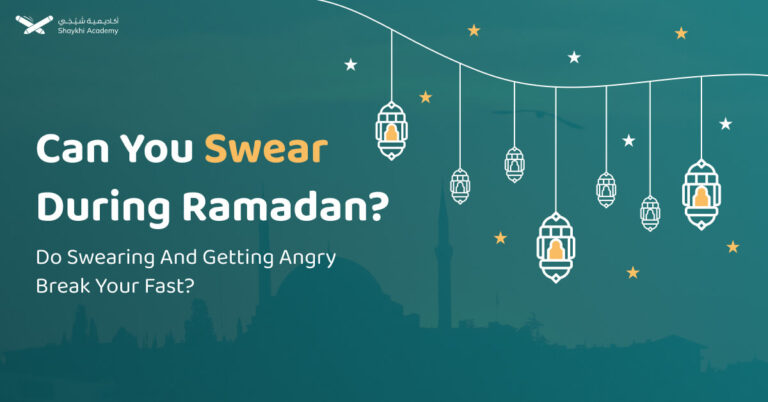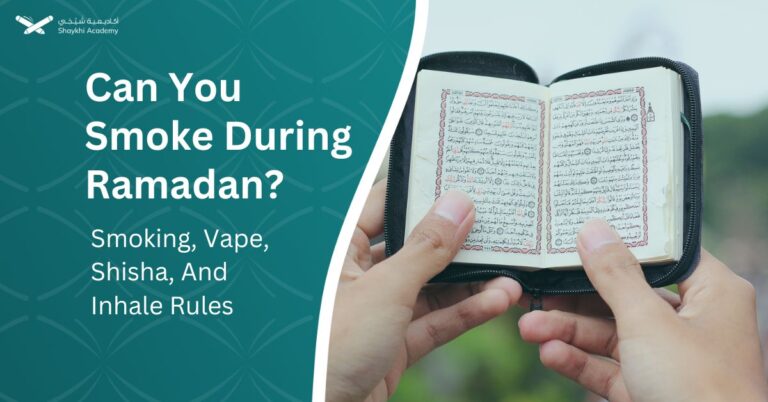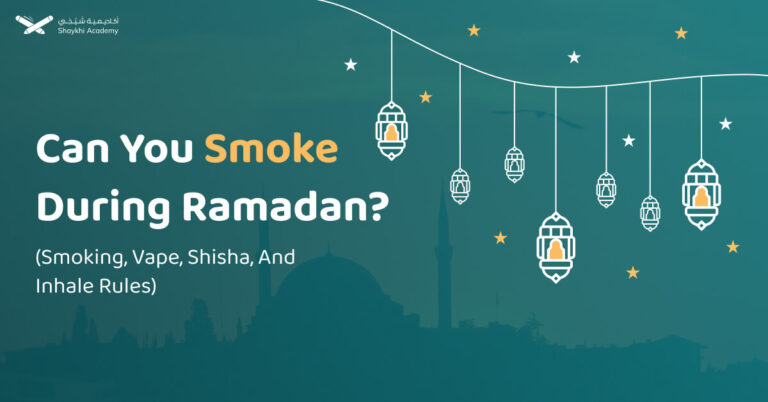What are the Ramadan Food and Eating Rules? During the holy month of Ramadan, Muslims observe fasting as a fundamental pillar of their faith, this period is marked by abstaining from food and drink from dawn until sunset, a practice that holds deep spiritual significance.
However, when the sun sets, it’s time for Muslims to break their fast, indulging in a meal known as iftar. Understanding the rules and practices surrounding food and eating during Ramadan is crucial for observing this sacred fasting time properly.
In a nutshel, “Ramadan food and eating” encapsulates the abstention from meals and beverages during daylight hours as Muslims observe fasting from dawn till sunset. This spiritual practice fosters self-discipline and a deeper connection with Allah. Accidental consumption during fasting hours doesn’t invalidate the fast, emphasizing sincerity in the practice.
Fasting begins at dawn and ends at sunset, with nighttime reserved for replenishment and gratitude. Iftar becomes a time of celebration and community, promoting moderation in consumption.
Food and Eating During Ramadan
The concept of “Ramadan food and eating” refers to the consumption of meals and beverages during the fasting hours of the month of Ramadan. While eating and drinking are permissible under normal circumstances in Islam, during Ramadan, Muslims engage in a spiritual journey characterized by self-discipline, self-reflection, and heightened devotion to Allah.
Central to the observance of Ramadan is the practice of fasting, wherein believers abstain from food, drink, and other physical indulgences from dawn until sunset. This act of self-restrain serves as a demonstration of devotion and obedience to Allah’s commandments, fostering spiritual growth and a deeper connection with Allah.
Can You Eat During Fasting Hours in Ramadan?
No, absolutely not, you cannot eat during fasting hours in Ramadan. During Ramadan fasting, Muslims are forbidden from consuming any sustenance, be it food or drink from dawn until sunset. Adherence to this regulation is paramount, necessitating strict abstinence from all forms of eating and drinking throughout daylight hours.
As the call to Maghrib prayer heralds the conclusion of the fasting period, Muslims eagerly await the moment to break their fast with iftar, a communal meal shared among family and friends. This post-fast repast not only provides essential nourishment following a day of abstinence but also serves as a festive occasion for communal bonding and expressions of gratitude.
What Happens if You Accidentally Eat While Fasting?
If you unintentionally consume food during the fasting hours, your fast remains valid. In Islam, there is no sin or penalty associated with accidental consumption or forgetfulness. Muslims should simply continue their fast for the remainder of the day, exercising greater caution in the future to avoid similar incidents.
Allah’s messenger said, “If anyone forgets when he is fasting and eats or drinks he should complete his fast, for it is only God who has fed him and given him drink.” (Bukhari and Muslim).
This leniency acknowledges the fallibility of human nature and underscores the importance of sincerity and intention in fasting. However, believers are urged to be mindful and avoid repeating such mistakes, remaining vigilant throughout the remaining fasting hours.
When to Stop Eating in Ramadan?
Fasting in Ramadan begins at dawn (fajr) and continues until sunset (maghrib). This marks the clear boundary for food consumption. Muslims must stop eating and drinking any liquids, including water, before the first light appears in the morning sky. So, the time to cease eating and drinking is upon the call of the Fajr prayer, marking the beginning of fasting hours until sunset.
Allah, the Exalted, says: “And eat and drink until the white thread of dawn becomes distinct to you from the black thread [of night] Then complete the fast until the sunset.” [Al-Baqarah 2:187].
When Can You Eat During Ramadan?
Muslims can eat during nighttime hours in Ramadan. From sunset onwards, after the Maghrib prayer call marks the end of the fasting period, Muslims can freely consume food and beverages until the next dawn. This time frame provides an opportunity for believers to replenish their bodies, strengthen familial bonds, and express gratitude for the sustenance provided by Allah.
Break your fast gradually with dates or water after sunset, followed by a balanced meal that includes essential nutrients to sustain the body throughout the night. It is essential to prioritize moderation and healthy eating habits during this time, avoiding overindulgence and excess.
Can You Eat at Night During Ramadan?
Yes, absolutely! Nighttime in Ramadan transforms into a celebratory time for families and communities to gather for Iftar, the meal that breaks the fast. It’s a time for shared meals, prayers, and social connection. Muslims can enjoy a variety of foods and drinks during this time, with a focus on healthy choices and mindful eating practices. Traditional dishes and sweet treats often grace the table, but remember, moderation is key.
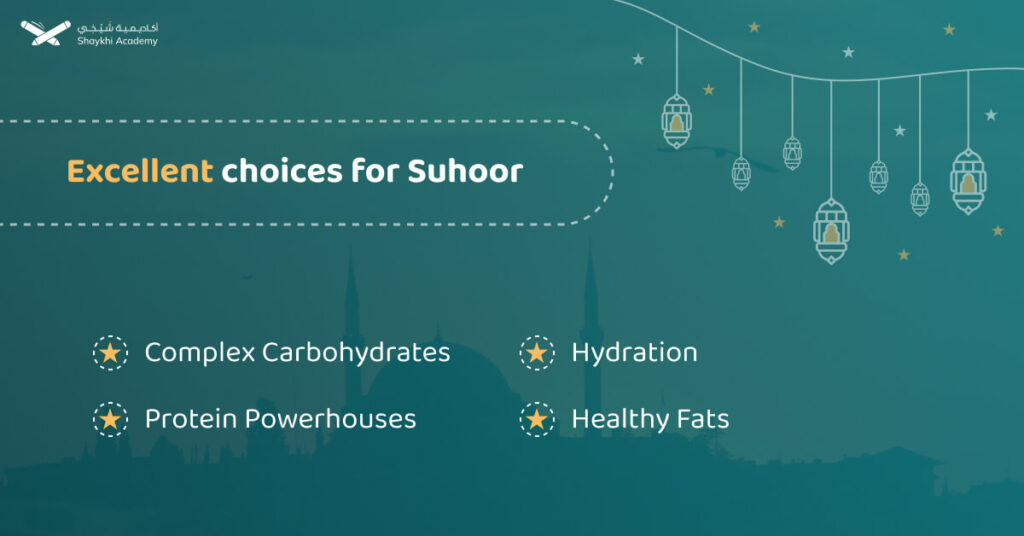
Best Foods to Eat Before Fasting in Ramadan
The pre-dawn meal, known as Suhoor, is a crucial aspect of Ramadan. Anas reported God’s messenger as saying, “Take a meal a little before dawn, for there is a blessing in taking a meal at that time.” (Bukhari and Muslim).
To sustain yourself throughout the fasting day, it’s recommended to prioritize foods that release energy slowly and keep you feeling full for longer. Here are some excellent choices for Suhoor:
- Complex Carbohydrates: Whole-wheat bread, oats, or brown rice provide a steady stream of energy to power you through the day.
- Protein Powerhouses: Include lean protein sources like eggs, chicken breast, or lentils to aid in feeling satiated and prevent hunger pangs.
- Hydration: Fruits and vegetables are packed with vitamins, minerals, and water, promoting overall well-being and hydration. Dates, a traditional and symbolic choice for Suhoor, are a great way to introduce natural sugars and electrolytes back into your system.
- Healthy Fats: Don’t shy away from healthy fats like those found in avocados or nuts. These provide sustained energy and a sense of satiety, helping you feel fuller for longer.
Delving into the Spiritual Depths of Refraining from Food
In Ramadan, refraining from food and drink throughout the daylight hours transcends mere sustenance; it becomes a journey of the soul. As Muslims abstain from worldly comforts, they embark on a quest for spiritual enlightenment, fortitude, and connection with Allah. This sacred fasting period serves as a catalyst for fostering empathy, thankfulness, and devotion within the hearts of believers.
Moreover, the communal act of breaking fast at iftar holds profound significance, knitting together the fabric of the Muslim community with threads of unity and compassion. As families and friends gather to share in the evening meal, the bonds of brotherhood and sisterhood are strengthened, echoing the timeless values of solidarity and mutual support. Thus, through adherence to the dietary guidelines of Ramadan, Muslims not only reaffirm their dedication to self-discipline and righteousness but also embrace the transformative power of communal worship and fellowship.
Unveil the Depths of Ramadan: A Journey Woven with Quran
Ramadan transcends the act of simply curbing hunger and thirst. It’s a sacred tapestry woven with threads of self-discovery and spiritual ascension. This year, embark on a deeper exploration by immersing yourself in the wisdom of the Quran.
Imagine the Quran as a radiant lamp illuminating your fast. As you recite its verses amidst the quietude of dawn, let them penetrate your soul, forging a stronger connection with the Divine.
Embrace the cherished tradition of Hifz, the memorization of the Quran. It’s a sacred act, etching Allah’s words onto your heart, and a path overflowing with blessings.
Open the Quran, Open Your Heart: A Journey with Shaykhi Academy
Ramadan’s light beckons. Feel the call to deepen your connection with the divine? Shaykhi Academy is your guide. We’re not just teachers, we’re fellow travelers on this transformative path of Quran memorization.
Expert Hands, Personalized Path:
Our qualified, native tutors walk with you, tailoring lessons to fit your busy life. No matter where you are, unlock the world of Quranic knowledge at affordable rates.
Discover Our Range of Courses:
- Arabic Noorani Qaida: Lay a solid foundation for Quranic studies.
- Online Quran Classes for Kids: Engaging lessons for lifelong learning.
- Tajweed Rules for Kids: Learn to recite with confidence.
- Quran Hifz for Kids: Step-by-step guidance to memorize the Quran.
- Quran for Adults: Introduce yourself to Quran reading and Tajweed rules.
- Online Arabic Courses: Master the language of the Quran.
- Islamic Studies: A wide range of topics related to Islam, including theology, law, Quranic studies, Hadith.
This Ramadan, choose growth. Join our vibrant community and embark on a sacred journey together. Let the Quran illuminate your heart. Let Shaykhi Academy be your compass.

Conclusion
In conclusion, Ramadan food and eating are deeply rooted in the spiritual practice of fasting observed by Muslims worldwide. Throughout the month of Ramadan, believers abstain from food, drink, and physical indulgences from dawn until sunset as a demonstration of devotion and obedience to Allah’s commandments. The practice of fasting fosters self-discipline, empathy, and a deeper connection with the divine.
Accidental consumption during fasting hours does not invalidate the fast, emphasizing sincerity and intention in the practice. The period of fasting begins at dawn with the Fajr prayer and ends at sunset with the Maghrib prayer, marking the time for iftar, a joyous occasion for communal bonding and gratitude. Muslims can eat freely during nighttime hours, focusing on moderation, healthy choices, and mindful eating practices. Ramadan serves as a time for spiritual growth, reflection, and strengthening familial bonds, with the observance of fasting playing a central role in this sacred journey.
